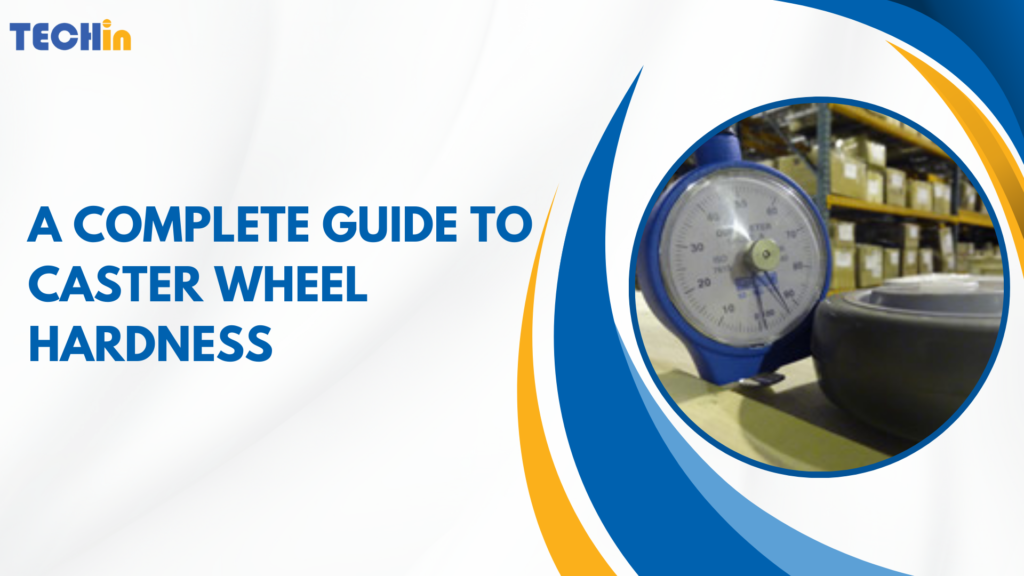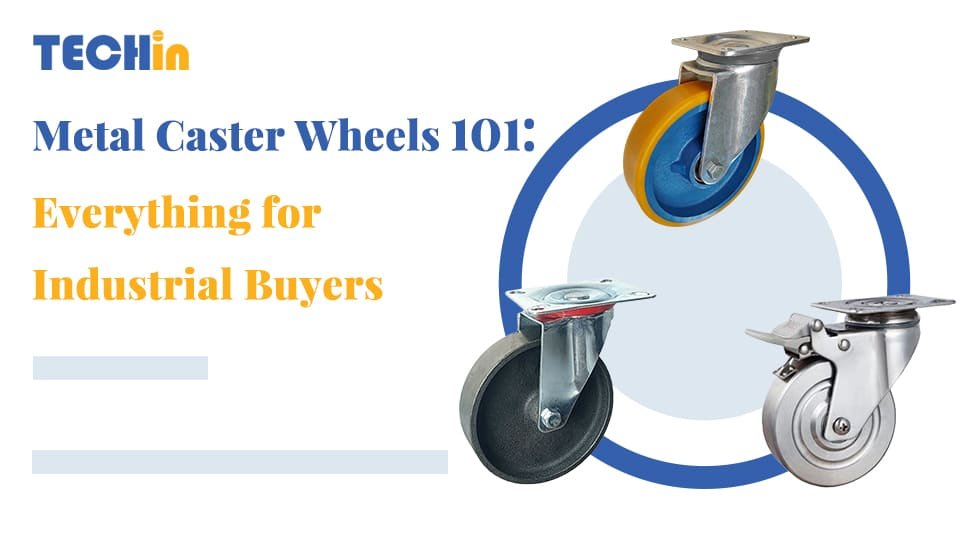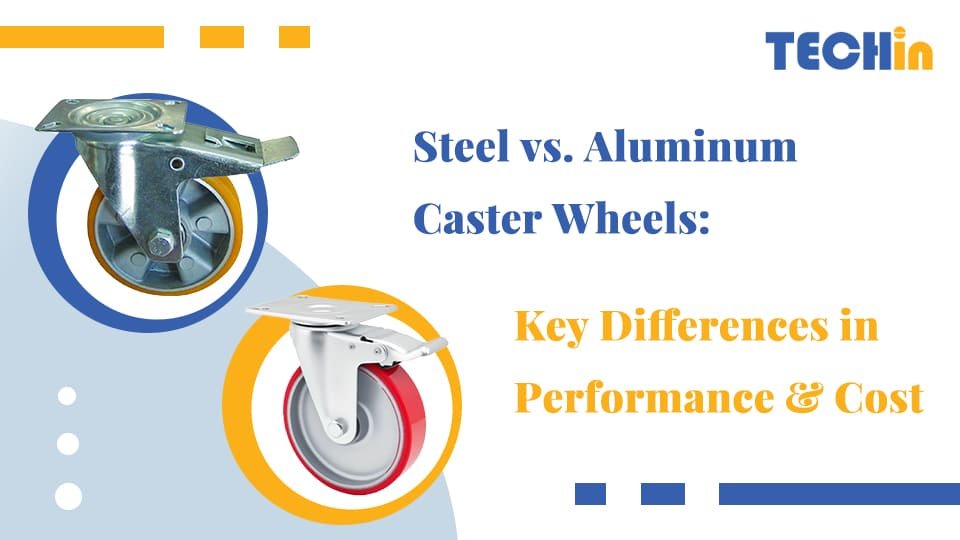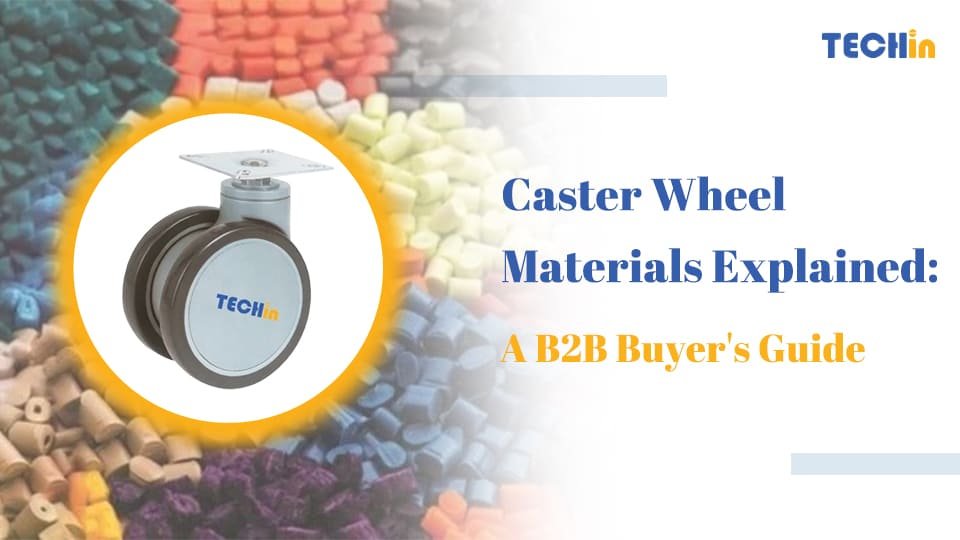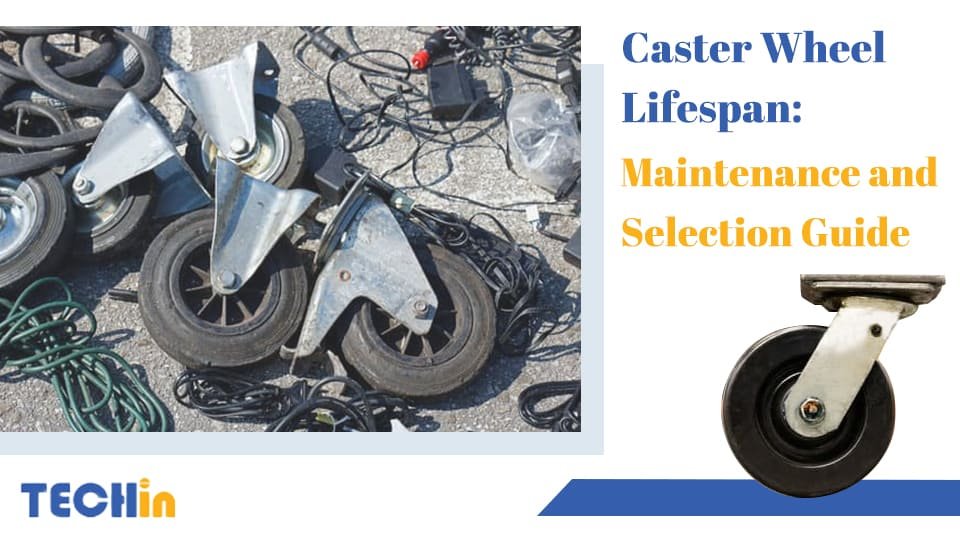When you’re picking out caster wheels, one of the most overlooked but important things to consider is the hardness of the material. This characteristic affects everything from how smoothly your caster rolls to how well it handles different loads and surfaces. If you pick a caster wheel that is too hard, you might damage your floors or struggle with poor shock absorption. On the other hand, if the caster is too soft, it could wear out quickly or not support the weight you need. In this guide, we will explore how to measure caster wheel hardness, interpret the durometer scale, and understand the hardness ranges of common materials like rubber, polyurethane, and steel.
To measure caster wheel hardness, you use a durometer, which measures a material’s resistance to being indented. The Shore scale—Shore A for softer materials like rubber and polyurethane, Shore D for harder materials like nylon and metals—gives you a number for hardness. You choose the right hardness based on the caster wheel material and the surface conditions where you’ll use it.
Now that we’ve covered the basics of caster wheel hardness, let’s get into how to measure it, why different materials have different hardness levels, and how that affects their performance.
What Is Caster Wheel Hardness?
Caster wheel hardness refers to how resistant the wheel material is to indentation and wear. This property influences the load capacity, ability to absorb shocks, and how well the caster rolls on various surfaces. The hardness of a caster wheel is typically measured using a durometer, a tool that quantifies the resistance of a material to penetration.
The Science Behind Hardness: Why It Varies by Material
Hardness varies between materials based on their molecular structure and the bonding forces between particles. Materials like rubber and polyurethane have elastic properties, making them softer and more flexible, while cast iron and steel have tightly packed molecules, making them harder and more rigid. Each material’s hardness influences how it interacts with surfaces, how much weight it can carry, and its resistance to environmental factors like heat, chemicals, and moisture.
How to Measure Caster Wheel Hardness with a Durometer
Step 1: Select the Right Durometer Scale
- Shore A is the scale commonly used for softer materials like rubber and polyurethane.
- Shore D is used for harder materials like nylon and steel.
Using the correct scale is essential for accurate readings.
Step 2: Prepare the Material
- Ensure that the surface of the caster wheel is clean and free from dust, debris, or oil. A dirty surface can affect the accuracy of the measurement by altering the durometer’s contact with the material.
Step 3: Using the Durometer
- Place the durometer firmly against the surface of the caster wheel and apply consistent pressure until the needle stabilizes.
- The durometer’s needle will indicate the hardness on a scale from 0 (very soft) to 100 (very hard).
Step 4: Read the Measurement
- Once the needle has stabilized, read the durometer scale. For example, a Shore A measurement of 75 would indicate a medium-hard rubber or polyurethane caster wheel suitable for moderate industrial use.
Step 5: Take Multiple Measurements
- To ensure consistency, measure the hardness at different points on the wheel, especially if the wheel is large or if the surface varies across the wheel. Averaging the readings will provide a more accurate hardness value.
Key Considerations:
- Temperature: Material hardness can be affected by temperature. For example, rubber becomes softer in high heat and harder in cold conditions, so it’s important to measure hardness in normal working temperatures.
- Surface Consistency: If the wheel has an uneven surface, it can cause inaccurate readings. Try to measure on the flattest and smoothest parts of the wheel.
Common Hardness Levels of Caster Wheel Materials
| Material | Hardness Range (Shore) | Typical Application |
|---|---|---|
| Rubber | 70-75 Shore A | Indoor use, smooth floors, light to medium loads, protects floors |
| Polyurethane | 80-95 Shore A | Warehouses, manufacturing plants, heavy loads, resists abrasion |
| Nylon | 70-80 Shore D | Heavy-duty, rough and uneven surfaces, industrial settings |
| Aluminum | 50-60 Shore D | Medium-duty, versatile, lighter than steel but durable |
| Foam | Low Shore A | Quiet operation, light-duty, sensitive surfaces |
| Cast Iron | 90-100 Shore D | Industrial environments, extreme loads, no floor protection |
| Forged Steel | 95-100 Shore D | Heavy-duty, industrial, extreme loads, minimal floor protection |
Rubber
- Hardness: 70-75 Shore A
- Features:
- Soft and flexible
- Excellent shock absorption
- Protects delicate floors
- Application:
Rubber caster wheels are ideal for indoor use on smooth floors. They can handle light to medium loads and are perfect for settings where floor protection is essential, such as in offices, hospitals, or light manufacturing environments. Their softness ensures minimal floor damage while offering better traction and quiet movement.
Polyurethane
- Hardness: 80-95 Shore A
- Features:
- Durable and resistant to wear
- Offers good floor protection
- Handles heavy loads
- Application:
Polyurethane wheels are common in industrial settings like warehouses and manufacturing plants. They offer the right balance between durability and floor protection, resisting chemicals, oils, and abrasions. Polyurethane caster wheels are often used in environments with heavy equipment and heavy-duty shelving due to their high load capacity and long-lasting performance.
Nylon
- Hardness: 70-80 Shore D
- Features:
- Extremely hard
- High load-bearing capacity
- Resistant to harsh conditions
- Application:
Nylon caster wheels are ideal for heavy-duty industrial applications where durability is critical. These wheels are commonly used on rough and uneven surfaces and can handle heavy loads without wearing out quickly. However, due to their hardness, nylon wheels can cause damage to softer flooring and are better suited for warehouses and factories with durable, rough floors.
Aluminum
- Hardness: 50-60 Shore D
- Features:
- Lightweight yet strong
- Durable for medium-duty applications
- Application:
Aluminum caster wheels provide a good balance of lightness and durability. These are ideal for environments requiring easy maneuverability, such as carts, trolleys, or other mobile equipment. Though not as hard as steel, aluminum wheels are robust enough for medium-duty tasks and lighter industrial use.
Foam
- Hardness: Low Shore A
- Features:
- Lightweight and quiet
- Soft and protective of delicate floors
- Application:
Foam caster wheels are designed for environments where quiet operation is a priority, such as in hospitals, medical equipment, or libraries. Their softness protects sensitive floors, making them suitable for light-duty applications that require minimal noise and floor protection.
Cast Iron
- Hardness: 90-100 Shore D
- Features:
- Extremely hard and durable
- Excellent load-bearing capacity
- No floor protection
- Application:
Cast iron wheels are used in environments that require maximum durability and load capacity. These are commonly found in industrial settings such as foundries or manufacturing plants where the floor surface is not a concern. Cast iron wheels are extremely tough but can cause significant floor damage, so they should only be used on rugged surfaces.
Forged Steel
- Hardness: 95-100 Shore D
- Features:
- Maximum hardness and durability
- Capable of handling extreme loads
- Minimal floor protection
- Application:
Forged steel caster wheels are ideal for the heaviest loads and toughest conditions in heavy-duty industrial environments. These wheels are excellent for factories and warehouses, but their hardness can cause floor damage on more delicate surfaces.
Interpreting the Results: What Do These Hardness Levels Mean?
The higher the Shore number, the harder the material. Here’s how you can apply this:
- Lower Shore A ratings (like rubber): Best for softer floors and light-duty applications.
- Higher Shore A ratings (like polyurethane): Great for general-purpose use in industrial environments.
- Shore D ratings (nylon, metal): Ideal for heavy-duty, high-load applications but should be used with care on delicate floors.
Summary
By choosing the right caster wheel material and hardness, you’ll get long-lasting performance and protect your equipment and floors. When you understand how hardness varies between materials and how to measure it using a durometer, you’ll be able to make informed decisions. Whether you need the flexibility of rubber, the durability of polyurethane, or the toughness of steel, matching the material to your application will improve performance and efficiency.
For more information on specific products or to inquire about custom solutions, please contact us.
Tel/Whatsapp: +8613417057114
Email: info@techincastor.com

